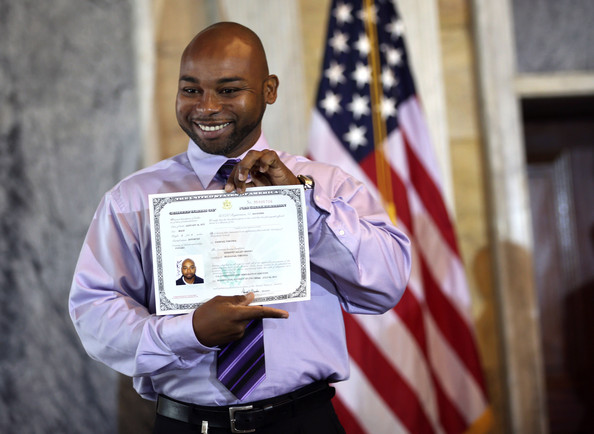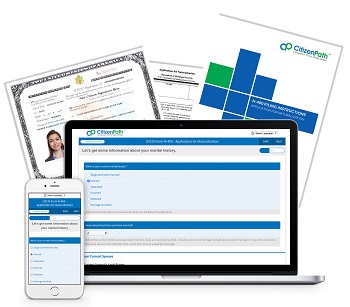How to Prepare for the U.S. Citizenship Test and Interview
U.S. Citizenship Test and Interview Overview
Are you worried about naturalization because of the test and interview?
More than 7.5 million people became naturalized U.S. citizens over the past 10 years. Yet, there are millions more eligible permanent residents (green card holders) that don’t take the next step because they're worried about the citizenship test and interview.
You can do it. In fact, more than 96 percent of applicants pass the test. Many resources are available to help you prepare for both the interview and test. When you know what to expect and do some preparation, you can successfully naturalize as a U.S. citizen. First, you'll need to file Form N-400, Application for Naturalization. Then, the U.S. citizenship test and interview happen near the end of the naturalization time line.
What Happens at Citizenship Interview
What should I expect at an N-400 interview?
At your interview, the USCIS officer will ask to see your identification, place you under oath, and ask you about:
- Your background
- Evidence supporting your case
- Your place and length of residence
- Your character
- Your attachment to the Constitution and
- Your willingness to take an Oath of Allegiance
Review your N-400 application carefully before attending the appointment. The USCIS officer will use the application to test your English and to confirm that the information you provided is accurate and up-to-date. If there are any differences between answers on application and your supporting documents, be prepared to explain the reason. Likewise, you should be prepared to offer any additional information. For example, you'll need to provide details of your time outside the United States if you traveled abroad since filing Form N-400. Your ability to understand the questions and answers in English is part of the interview.
In most cases, small changes to your application are insignificant. A new job, a new address, or even a new child generally will not affect your eligibility to naturalize. Other changes may affect your eligibility. For example, if you have:
- Traveled abroad for a period of greater than six months;
- Been arrested for certain crimes or otherwise interfered with the good moral character requirement; or
- Recently divorced the U.S. citizen who you are using as the basis of your N-400 eligibility (LPR with 3 years of marriage to a U.S. citizen).
In these situations, we recommended that you consult with an immigration lawyer before attending the naturalization interview.
How to Prepare for the Citizenship Test - English
What should I expect on the English test for naturalization?
Remember, the USCIS officer will evaluate your ability to understand and speak basic English from the moment they meet you. If you don’t understand a question, it’s okay to ask the officer to rephrase it.
During your interview, the USCIS officer will test your ability to read, write, and speak English (unless you are exempt from the English requirements). They will test your English skills in the following ways:
- Reading -- To test your ability to read in English, you must read one sentence, out of three sentences, in a manner suggesting to the USCIS officer that you understand the meaning of the sentence.
- Writing -- To test your ability to write in English, you must write one sentence, out of three sentences, in a manner that would be understandable as written to the USCIS officer.
- Speaking -- Your ability to speak English is determined by your answers to questions normally asked by USCIS officers during the naturalization eligibility interview on Form N-400.
Several FREE study tools are available from USCIS to help you prepare for the English portion of the citizenship test.
Reading Vocabulary Flash Cards
Easy-to-use flash cards containing vocabulary words to help study for the English reading portion of the test.
Writing Vocabulary Flash Cards
Easy-to-use flash cards containing vocabulary words to help study for the English writing portion of the test.
Reading Test Vocabulary List
Official list of vocabulary words for the English reading portion of the U.S. citizenship test and interview.
How to Prepare for the Citizenship Test – History/Civics
What should I expect on the civics test for naturalization?
You will also take a civics test to evaluate your knowledge and understanding of U.S. history and government. Unless you qualify for a language accommodation, USCIS will administer the test in English. Even if you're exempt from the English test, you will need to take the civics test in the language of your choice or qualify for an N-648 waiver.
You may have heard that the Trump administration updated the civics test in 2020. This is true, but the Biden administration reversed these changes. The permanent (2008) version of the civics test has 100 possible questions. During your test, the USCIS officer will ask you up to 10 questions from the list of 100 questions in English. You must answer correctly six of the 10 questions to pass the civics test in English. All questions on the test are asked orally.
Several FREE study tools are available from USCIS to help you prepare for the history/civics portion of the test. Are you anxious to learn about U.S. history? Start with Learn About the United States, a comprehensive booklet full of quick civics lessons.
Learn & Explore
This study guide groups questions into themes to help you understand how the content is related. Each question has a short video page that provides the answer to the question along with historical content. Each video is followed by a multiple-choice quiz, and some also have practice activities. As you complete each question, a white checkmark will appear to help you track your progress.
Test Yourself
During the naturalization interview, a USCIS Officer will ask you up to 10 civics questions from the list of 100. You must correctly answer six (6) questions to pass the civics portion of the naturalization test. You will need to say the answers aloud. In the official test, the questions are not multiple choice. Here, you can practice taking the test. Good luck!
100 Civics Questions and Answers
This is an official list of civics questions and answers for the test. If you know these answers, you'll pass the test.
USCIS Civics Practice Test
This civics practice test on the USCIS website can help you test your knowledge of U.S. history and government.
Civics Flashcards
Easy-to-use downloadable flash cards containing each of the potential 100 civics questions and answers.
Exemptions & Accommodations for U.S. Citizenship Test
Can I get a waiver for the test?
There are exemptions and modifications to the naturalization requirements that are available to certain individuals who qualify.
English Language Exemptions
When preparing Form N-400, Application for Naturalization, you have the opportunity to select certain exemptions. You are exempt from the English language requirement if you are:
- Age 50 or older at the time of filing Form N-400 and have lived as a permanent resident (green card holder) in the United States for 20 years or more. This is also known as the “50/20” exception; or
- Age 55 or older at the time of filing Form N-400 and have lived as a permanent resident in the United States for 15 years or more. This is also known as the “55/15” exception.
Civics Test Accommodations
Even if you qualify for the “50/20” or “55/15” English language exemptions listed above, you must still take the civics portion of the U.S. citizenship test. If you qualify for the exemptions listed above, you will be permitted to take the civics test in your native language. To use an interpreter during the civics test, you will also need to:
- Bring an interpreter with you to your interview; and
- Your interpreter must be fluent in both English and your native language.
If you are age 65 or older and have been a permanent resident for at least 20 years at the time of filing for naturalization, you will also be given a simplified version of the civics test. You qualify to take the civics test in the language of your choice. USCIS will only require you to study 20 of the 100 civics test questions for the naturalization test. See the Civics Questions for the 65/20 Exemption.
Exemptions for Individuals with Disabilities and/or Impairments
If you have a physical or developmental disability or mental impairment that prevents you from demonstrating your knowledge and understanding of the English language and/or civics requirements for naturalization, you may qualify for an exemption to certain parts of the naturalization test. You must submit an original Form N-648, Medical Certification for Disability Exceptions, at the time of filing Form N-400. The Form N-648 must have been prepared by a licensed medical or osteopathic doctor or licensed clinical psychologist less than six months prior to filing Form N-400.
What to Take to Your Citizenship Interview
Are there things that I should bring with me to the test and interview?
After you file Form N-400, Application for Naturalization, begin keeping a file that includes a copy of the application, originals of the supporting documentation that was submitted with your application, and any letters you receive from USCIS. This will make it easier to find and review the information before your interview.
The naturalization interview is the final hurdle in becoming a U.S. citizen. If all goes well, you could have a decision after the interview. Learn more about what happens at the naturalization interview.

Naturalization Test Stats
The vast majority of N-400 applicants pass the citizenship test. Remember, if you do not pass the first time, you'll be able to re-take the test. The diagram below shows that 96.1 percent of all applicants pass the naturalization test. Most people who do not pass during the initial interview are able to pass on the re-exam.
* Data based on USCIS Naturalization Test Performance FY21
How CitizenPath Helps You Naturalize
How do I get started?
CitizenPath's affordable, online service makes it easy to prepare Form N-400, Application for Naturalization. Designed by immigration lawyers, the Naturalization Package helps you eliminate the common errors that create delays, rejections and even denials. That's because the service alerts you when your answer to a question may be a problem. You'll also get customized filing instructions based on your situation. It's a powerful, do-it-yourself tool that puts you in control. And we've got your back -- CitizenPath provides live customer support and provides a money-back guarantee that USCIS will approve the application. Learn more >>
STEP 1 | Check Eligibility | |
We're going to ask you a few questions to make sure you're eligible and preparing the correct form. | ||
STEP 2 | Prepare Form N-400 | |
Our software will guide you through the N-400 application using simple step-by-step instructions. | ||
STEP 3 | Download, Print and File | |
Once you're completely satisfied, you’ll be able to print your N-400 and customized filing instructions. | ||



